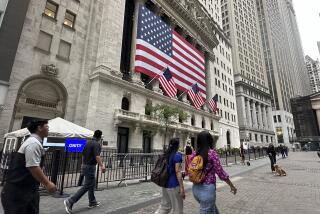STOCKS : Dow Tumbles 28.18 as Investor Jitters Mount
Stock prices tumbled Friday, as worries over corporate earnings and political tensions in the Middle East and Eastern Europe closed out a generally strong first half of 1991 on a wary note.
The Dow Jones industrial average closed down 28.18 points, or 1%, to 2,906.75. The Dow had been down more than 50 points before it trimmed its losses. The index lost 58.81 points for the week.
Declining issues outnumbered advances in nationwide trading of New York Stock Exchange-listed stocks, with 901 down and 677 up.
For the first half of 1991, the Dow posted a 10.4% rise, gaining 273.09 points from 2,633.66 at the end of 1990.
But all of the net gain came in the first quarter. The Dow lost 0.2% during the second quarter, despite reaching an all-time high of 3,035.33 on June 3.
Small stocks, as represented by the NASDAQ over-the-counter index, fell 1.3% in the quarter, but still are up 27.3% for the half.
Friday, Big Board volume was a moderate 162.01 million shares as of 4 p.m. EDT, against 155.84 million at the same point Thursday. An additional 664,000 changed hands in after-hours trading.
One of the market’s major anxieties Friday was a rumor--later denied--that Chase Manhattan Bank was having funding problems. Chase fell 1 1/8 to 16 1/4.
What’s more, growing violence in Yugoslavia and a new standoff between the United States and Iraq caused rising investor jitters, beginning overseas.
In Frankfurt, the 30-share DAX average plummeted 43.91 points, or 2.6%, to 1,622.18. Investors fretted over a court ruling that could lead to tighter controls on taxation of investment earnings. Yugoslavia’s turmoil also hurt.
In London, the Financial Times 100 index followed German stocks lower and finished at its lowest close in four months, down 37.7 points, or 1.5%, to 2,414.8.
In Tokyo, the 225-share Nikkei average lost 252.07 points to 23,290.96. It fell 984.12 points from last week as investors continued to react negatively to a broadening stock scandal among major Tokyo brokerages.
Among the U.S. highlights:
* Other leading bank stocks dropping on the Chase rumors included Chemical Banking, off 5/8 to 21 3/8; Manufacturers Hanover, 1/2 to 21 5/8; Wells Fargo, 1 3/8 to 69; and First Interstate, 1 5/8 to 31 3/8.
* The Dow’s weakness was concentrated in Kodak, down 1 to 38 3/4; Caterpillar, off 1 1/8 to 49 3/8; and Bethlehem Steel, down 5/8 to 16 1/8.
* Drug stocks, which have seesawed constantly in recent months, were hit again. Merck fell 2 3/8 to 116 1/8, American Home Products lost 1 3/8 to 59 5/8 and Upjohn dropped 1 1/4 to 42 3/8.
* Pacoima-based athletic shoe firm K Swiss tumbled 3 1/4 to 20 1/4 after Goldman Sachs cut earnings estimates.
Credit
Bond yields dropped sharply on buying by German investors and new reports that appeared to dampen prospects of a speedy economic recovery.
The Treasury’s 30-year bond gained 23/32 point, or $7.19 per $1,000 in face amount. Its yield tumbled to 8.41% from 8.48% late Thursday.
The bond market rose briskly after reports from the Chicago Purchasing Management association, which showed declines in economic activity in June.
Joseph Liro, senior vice president for S. G. Warburg & Co., said a decline in the purchasing managers’ index suggested that a national survey on purchasing activity, to be released Monday, would show a similar decline.
Sung Won Sohn, economist for Norwest Corp. in Minneapolis, said a drop in the Commodity Research Bureau’s key commodity index to four-year lows also cheered bond traders, because falling commodity prices suggest lower inflation.
The market also had support from German investors, who bought U.S. bonds aggressively because of indications that a withholding tax may be imposed on German interest income.
The federal funds rate, the interest on overnight loans between banks, was quoted at 8%, up sharply from 5.75% late Thursday. Analysts said they weren’t aware of any specific developments to push the funds rate higher, though bank troubles may have contributed to the rise.
Currency
The dollar soared against the German mark as traders worried about possible new taxes on German investment earnings, and fighting raged in nearby Yugoslavia.
Investors began selling marks on concern that Germany is planning to reinstitute a withholding tax on interest income. German Finance Minister Theo Waigel said the tax wouldn’t be introduced any time soon, but that failed to stem a mark-selling spree.
The dollar jumped to 1.811 marks, up from Thursday’s finish of 1.795. It fell slightly against the Japanese yen, ending at 137.53 compared to 137.80 Thursday.
Traders said nervousness over what impact the political unrest in Yugoslavia might have on the German economy also fueled a flight from marks. The dollar benefited from the Yugoslavia situation, since it is perceived as a safe haven in times of world turmoil.
Commodities
Soybeans futures prices sank to 3 1/2-year lows on the Chicago Board of Trade as traders interpreted a government report and weather forecasts to mean a record crop this fall.
Soybeans plunged 20.5 cents to 24.25 cents, with the contract for delivery in July at $5.28 a bushel. July soybeans traded as low as $5.225, the lowest since November, 1987.
Elsewhere, gold was $2.10 to $2.30 higher with July at $368.10 an ounce on New York’s Comex. Silver settled 3.7 cents to 3.9 cents higher with July at $4.42.
The August contract for delivery of light, sweet crude oil rose 8 cents to $20.56 a barrel on the New York Merc.
More to Read
Inside the business of entertainment
The Wide Shot brings you news, analysis and insights on everything from streaming wars to production — and what it all means for the future.
You may occasionally receive promotional content from the Los Angeles Times.










